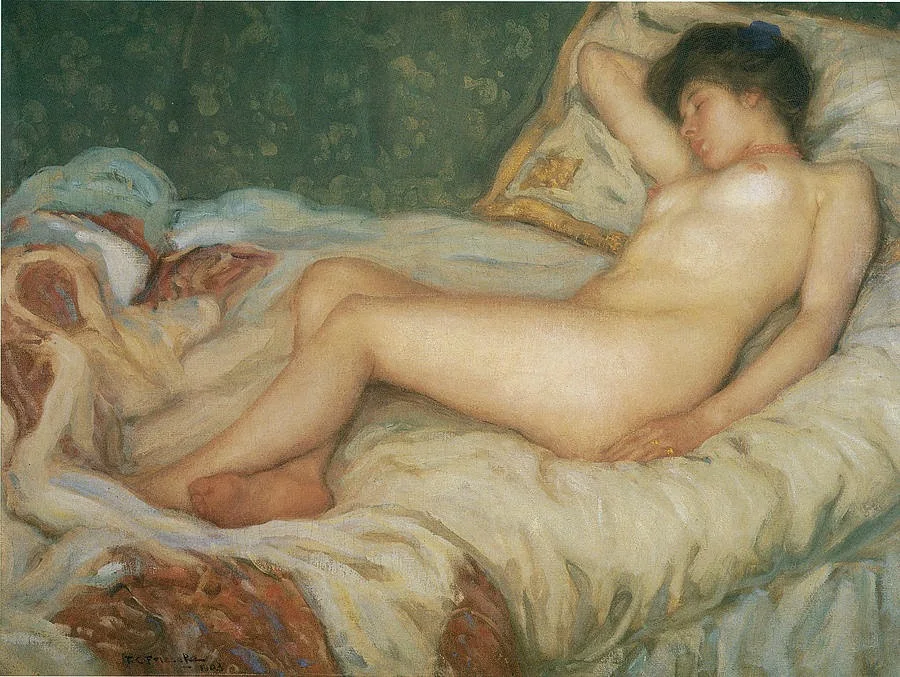Paul Delvaux, Le Village des Sirènes, 1942. Huile sur
Toile, 105x127 cm, Chicago, The Art Institute.
Όπου
αποδεικνύεται ότι σωτήρια μπορεί να φανούν και τα ανεπαρκή, ακόμη και τα
παιδαριώδη μέσα:
Léon Belly, Ulysses And The Sirens, 1867.
Για
να προφυλαχτεί από τις Σειρήνες, ο Οδυσσέας έφραξε τα αυτιά του με κερί και
έβαλε να τον αλυσοδέσουν στο κατάρτι. Κάτι ανάλογο, ασφαλώς, θα μπορούσαν να
κάνουν ανέκαθεν όλοι οι ταξιδιώτες ―εκτός από εκείνους που οι Σειρήνες
πρόφταιναν να τους σαγηνεύσουν από μακριά― ήταν όμως παγκοσμίως γνωστό ότι δεν
οφελούσε. Το τραγούδι των Σειρήνων διαπερνούσε τα πάντα, και το πάθος των
σαγηνευμένων δεν ήταν ικανό να σπάσει μόνο αλυσίδες και κατάρτια. Αυτό ο
Οδυσσέας δεν το σκέφτηκε, αν και πολύ πιθανόν το είχε ακουστά. Εναπέθεσε τις
ελπίδες του σε μια χούφτα κερί και μια αρμαθιά αλυσίδες, και γεμάτος αθώα χαρά
για τα πενιχρά του μέσα, έβαλε πλώρη για τις Σειρήνες.
John William Waterhouse, Sirène, 1900.
Οι
Σειρήνες όμως έχουν ένα όπλο πιο φοβερό και από το τραγούδι: τη σιωπή τους. Και
πιθανότερο, παρόλο που δεν έτυχε ποτέ, θα ήταν να γλιτώσεις από το τραγούδι
τους, παρά από τη σιωπή τους. Τίποτε στον κόσμο αυτόν δεν μπορεί να αντισταθεί
στο αίσθημα πως τις νίκησες με το σπαθί σου, ούτε στην αλαζονεία που
επακολουθεί και σαρώνει τα πάντα.

Gustav Wertheimer, The Kiss of the Siren, 1882.
Κι
η αλήθεια είναι πως δεν τραγουδούσαν οι τρομερές Σειρήνες καθώς τις ζύγωνε ο
Οδυσσέας· γιατί πίστευαν, ίσως, ότι με τη σιωπή τους μόνο θα νικούσαν τούτο τον
αντίπαλο ― εκτός κι αν, βλέποντας τόση ευτυχία στο πρόσωπο του Οδυσσέα, που
μόνο το κερί σκεφτόταν και τις αλυσίδες του, λησμόνησαν κάθε τραγούδι.
Herbert James
Draper, Ulysses and the Sirens, 1909.
Ο
Οδυσσέας όμως, τη σιωπή τους, ας μου επιτραπεί η έκφραση, δεν την άκουσε: του
φάνηκε πως τραγουδούσαν, και πως μόνο εκείνος δεν τις άκουγε, επειδή είχε λάβει
τα μέτρα του. Πριν ξεκινήσει, έριξε μια κλεφτή ματιά, είδε τον καμπυλωμένο
λαιμό, τις βαθιές ανάσες, τα δακρυσμένα μάτια, το μισάνοιχτο στόμα, και πίστεψε
πως όλα αυτά συνόδευαν τις άριες που ανάκουστες αντηχούσαν γύρω του. Κι έπειτα
δεν τις ξανακοίταξε, γύρισε το βλέμμα του πέρα, μακριά, κι εμπρός στην
αταλάντευτη απόφασή του οι Σειρήνες κυριολεκτικά εξαφανίστηκαν, τόσο που, κι
όταν βρέθηκε κοντά τους, μήτε που τις πρόσεξε.
Ferdinand Max
Bredt, The Sirens, 1902.
Εκείνες
όμως, ωραιότερες παρά ποτέ, συστρέφονταν, τεντώνονταν, παράδερναν τα απαίσια
μαλλιά τους με τον άνεμο, και τα γαμψά τους νύχια σέρνονταν πάνω στα βράχια.
Και πια δεν ήθελαν να ξελογιάσουν ― μόνο να κρατήσουν ένα καθρέφτισμα από τα
μεγάλα μάτια του Οδυσσέα ήθελαν, όσο γινόταν πιο πολύ.
Victor Karlovich
Shtemberg, Sirènes au bord de l'eau.
Αν
οι Σειρήνες είχαν συνείδηση, εκείνη η φορά θα ήταν το τέλος τους. Τίποτε
δεν έπαθαν όμως· απλώς, ο Οδυσσέας τους ξέφυγε.
John William Waterhouse,
Ulysses and the Sirens, 1891.
Στην
ιστορία αυτή υπάρχει πάντως κι ένα υστερόγραφο: Ο Οδυσσέας ήταν, λένε, τόσο
πολυμήχανος, τέτοια αλεπού, που μήτε η Θεά του Πεπρωμένου δεν μπορούσε να
διαβάσει την ψυχή του. Και ίσως, αν και κάτι τέτοιο υπερβαίνει την ανθρώπινη λογική
― ίσως να πρόσεξε στ’ αλήθεια πως σωπαίναν οι Σειρήνες, κι όλες αυτές οι
προσποιήσεις που αναφέραμε, ήταν κάτι σαν ασπίδα, που την όρθωσε μπροστά τους,
και μπροστά στους θεούς.
Ελληνική
μετάφραση Τζένη Μαστοράκη & Νάσος Βαγενάς.
"The
silence of the Sirens"
Paul Delvaux, The Great Sirens, 1947.
Proof that
inadequate, even childish measures, may serve to rescue one from peril.
Carl von Blaas, Ulysses and Sirens, 1882.
To protect himself
from the Sirens Ulysses stopped his ears with wax and had himself bound to the
mast of his ship. Naturally any and every traveller before him could have done
the same, except those whom the Sirens allured even from a great distance; but it
was known to all the world that such things were of no help whatever. The song
of the Sirens could pierce through everything, and the longing of those they
seduced would have broken far stronger bonds than chains and masts. But Ulysses
did not think of that, although he had probably heard of it. He trusted
absolutely to his handful of wax and his fathom of chain, and in innocent
elation over his little stratagem sailed out to meet the Sirens.
Henri Lehmann, Sirènes appelant Ulysse, c.1847.
Now the Sirens have
a still more fatal weapon than their song, namely their silence. And though
admittedly such a thing has never happened, still it is conceivable that
someone might possibly have escaped from their singing; but from their silence
certainly never. Against the feeling of having triumphed over them by one's own
strength, and the consequent exaltation that bears down everything before it,
no earthly powers could have remained intact.
Christopher
Pugliese, Ulysses and the Sirens,
2003.
And when Ulysses
approached them the potent songstresses actually did not sing, whether because
they thought that this enemy could be vanquished only by their silence, or
because of the look of bliss on the face of Ulysses, who was thinking of
nothing but his wax and his chains, made them forget their singing.
Detail from Ulysses
and the Sirens (260 AD), mosaic from wealthy family’s villa at Thugga (Dougga),
now in the Bardo.
But Ulysses, if one
may so express it, did not hear their silence; he thought they were singing and
that he alone did not hear them. For a fleeting moment he saw their throats
rising and falling, their breasts lifting, their eyes filled with tears, their
lips half-parted, but believed that these were accompaniments to the airs which
died unheard around him. Soon, however, all this faded from his sight as he
fixed his gaze on the distance, the Sirens literally vanished before his
resolution, and at the very moment when they were nearest to him he knew of
them no longer.
Gustave Adolphe
Mossa, Satiated Siren, 1905.
But they--lovelier
than ever--stretched their necks and turned, let their cold hair flutter free
in the wind, and forgetting everything clung with their claws to the rocks.
They no longer had any desire to allure; all that they wanted was to hold as
long as they could the radiance that fell from Ulysses' great eyes.
Gustave Moreau, Les Sirènes, 1882.
If the Sirens had
possessed consciousness they would have been annihilated at that moment. But
they remained as they had been; all that had happened was that Ulysses had
escaped them.
Howard Pyle, The Mermaid, 1910.
A codicil to the
foregoing has also been handed down. Ulysses, it is said, was so full of guile,
was such a fox, that not even the goddess of fate could pierce his armour.
Perhaps he had really noticed, although here the human understanding is beyond
its depths, that the Sirens were silent, and opposed the afore-mentioned
pretence to them and the gods merely as a sort of shield.
Franz Kafka in 1905. Photograph: Getty Images/Hulton
Archive.







.jpg)






























